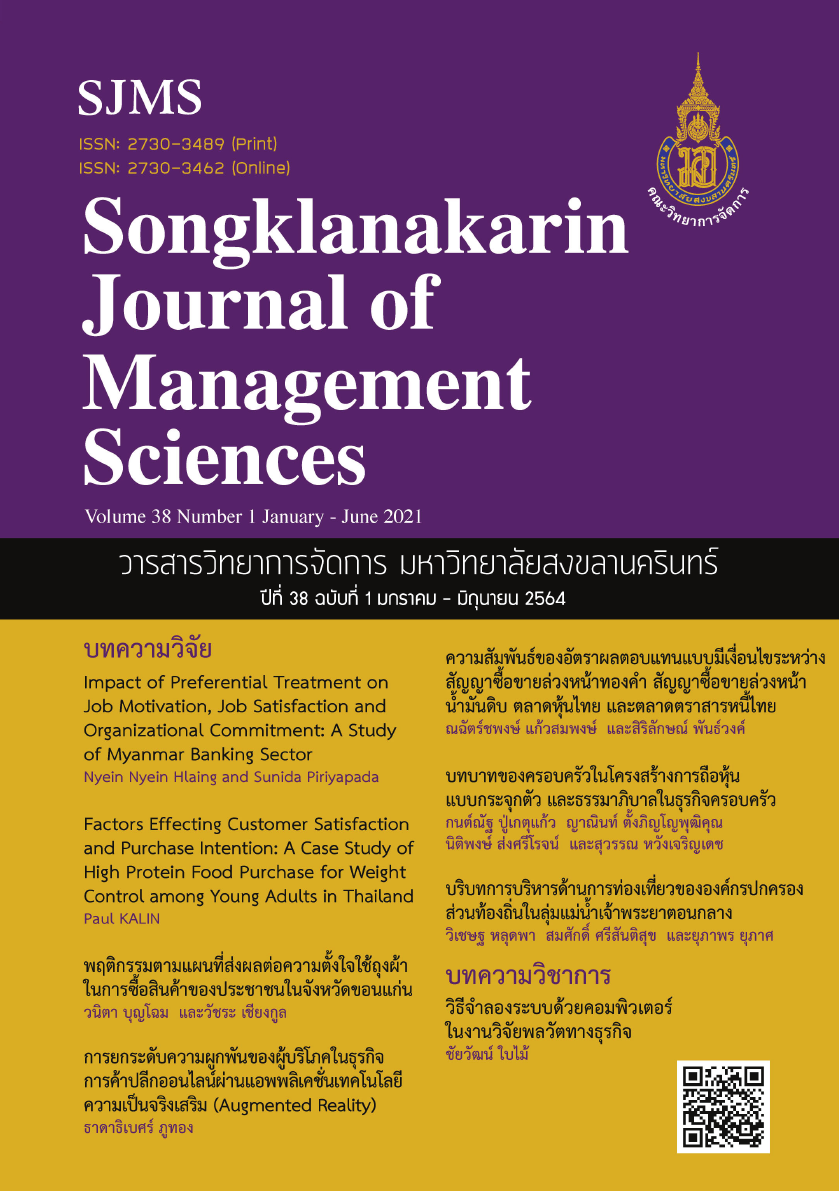The Effects of Planned Behavior on Intention to Use Eco-Friendly Shopping Bags in Khon Kaen Province
Main Article Content
Abstract
This research aimed to study factors affecting the intention of using eco-friendly shopping bags in Khon Kaen. Underlying Planned Behavior Theory (Ajzen, 1991; Chang & Chou, 2018; Taufique & Vaithianathan, 2018; Ekasari, 2018). The sample consisted of 400 people in Khon Kaen province. The study used the accidental sampling. The questionnaires were used as tools for data collection. The statistics using for analyzing the data were mean, standard deviation, Independent-samples t-test, One-way Anova, Pearson correlation coefficient, and multiple regression. The results revealed that attitude toward expectation behavior and perceived behavior control in interests, perceived behavior control in supporting activities affected the intention of using eco-friendly shopping bags. This study contributes to government agencies can be used as public policy and strategies for creating understanding and cultivating knowledge for all citizens in order to adjust the attitude and raise awareness for the conservation of the environment.
Article Details

This work is licensed under a Creative Commons Attribution-NonCommercial-NoDerivatives 4.0 International License.
All published articles are SJMS’s copyright. The editorial board allows all published articles to be copied, excerpted, or disseminated with academic citation.
References
Ajzen, I. & Fishbein, M. (1970). The prediction of behavior from attitudinal and normative variables. Journal of Experimental Social Psychology, 6(4), 466–487.
Ajzen, I. (1991). The theory of planned behaviors. Organizational Behavior and Human Decision Process, 50(2), 179-211.
Archarungroj, P. & Sirikudta, S. (2018). Motivation, Integrated Marketing Communication and Behavioral Trends in Using Eco-friendly Shopping Bags of Consumers in Bangkok Metropolitan Area. Journal of Social Sciences Srinakharinwirot University, 21, 174-193.
Bartolotta, J. F. & Hardy, S. D. (2018). Barriers and benefits to desired behaviors for single use plastic items in northeast Ohio's Lake Erie basin. Marine Pollution Bulletin, 127, 576-585.
Busse, M. & Menzel, S. (2014). The role of perceived socio-spatial distance in adolescents’ willingness to engage in pro-environmental behavior. Journal of Environmental Psychology, 40, 412-420.
Chang, S. H. & Chou, C. H. (2018). Consumer Intention toward Bringing Your Own Shopping Bags in Taiwan: An Application of Ethics Perspective and Theory of Planned Behavior. Sustainability, 10(6), 1-14.
Ekasari, A. (2018). Pengaruh Drive for Environmental Responsibility, Collectivism dan Subjective Norm terhadap Behavioral Intention Penggunaan Reusable Bag. Jurnal Manajemen dan Pemasaran Jasa, 11(2), 201-216.
Farrow, K., Grolleau, G. & Ibanez, L. (2017). Social Norms and Pro-environmental Behavior: A Review of the Evidence. Ecological Economics, 140, 1–13.
Fishbein, M., & Ajzen, I. (1975). Belief, attitude, intention, and behavior: An introduction to theory and research. Reading, MA: Addison-Wesley.
Gano-an, J. C. (2018). Consumers’ preferences on the use of eco-friendly bags: A green marketing perspective. Journal of Economics, Business, and Accountancy Ventura, 20(3), 357-362.
Jakovcevic, A., Steg, L., Mazzeo, N., Caballero, R., Franco, P., Putrino, N., & Favara, J. (2014). Charges for plastic bags: Motivational and behavioral effects. Journal of Environmental Psychology, 40, 372-380.
Lealaphan, A. & Launglaor, W. (2014). Attitudes and Behavior of Bangkok Residents regarding Reducing the Use of Plastic Bags. University of the Thai Chamber of Commerce Journal. 34(1), 70-88.
Munn, N. L. (1971). Introduction to Psychology. Boston: Houghton Muffin.
National Statistical Office. (2017). Khon Kaen Provincial Statistical Report. Retrieved October 20, 2019, from https://issuu.com/khonkaen.nso.go.th.
Nunnally, J. C. (1978). Psychometric theory (2nd ed.). New York: McGraw-Hill.
O’Brien, J. & Thondhlana, G. (2019). Plastic bag use in South Africa: Perceptions, practices and potential intervention strategies. Waste Management, 84, 320-328.
O’brien, R. M. (2007). A Caution Regarding Rules of Thumb for Variance Inflation Factors. Quality & Quantity, 41, 673–690.
Pollution Control Department. (2019). Annual Report 2018 Waste and Hazardous Substances Management Bureau. Retrieved October 18, 2019, from http://www.pcd.go.th/public/Publications/file/wsthaz61_annual.pdf
Sampradit, P. & Thongjeen, C. (2017). Media Perception, Attitude, and Social Responsibility that Affects on Thai People's Decision Making in Using Tops. Proceedings of the 7 th STOU National research conference (pp. 122-133). Nonthaburi: Sukhothai Thammathirat.
Schwartz, S. (1977). Normative influences on Altruism. Advances in experimental social psychology, 10, 221-279.
Smith, M., Cho, E., & Smith, K. R. (2016). The effects of young consumers’ perceptions of environment-friendly shopping bags and environmental consciousness on attitudes and purchase intentions. The Research Journal of the Costume Culture, 24(5), 687-696.
Spranz, R., Schlüter, A., & Vollan, B. (2018). Morals, money or the master: The adoption of eco-friendly reusable bags. Marine Policy, 96, 270-277.
Sun, Y., Wang, S., Li, J., Zhao, D. & Fan, J. (2017). Understanding consumers’ intention to use plastic bags: using an extended theory of planned behaviour model. Natural Hazards, 89, 1327–1342.
Taufique, K.M.R & Vaithianathan, S. (2018). A fresh look at understanding Green consumer behavior among young urban Indian consumers through the lens of Theory of Planned Behavior. Journal of Cleaner Production, 183, 46-55.
Tabachnick, B.G. & Fidell, L.S. (2018). Using Multivariate Statistics (7th ed). Allyn and Bacon, Boston.
Vassanadumrongdee, S., Hoontrakool, D., & Marks, D. (2020). Perception and Behavioral Changes of Thai Youths Towards the Plastic Bag Charging Program. Applied Environmental Research. 42(2). 27-45.
Xanthos, D. & Walker, T. R. (2017). International policies to reduce plastic marine pollution from single-use plastics (plastic bags and microbeads): A review. Marine Pollution Bulletin, 118(1-2), 17–26.
Yamane, T. (1970). Elementary sampling theory. Englewood Cliff, NJ: Prentice Hall.

